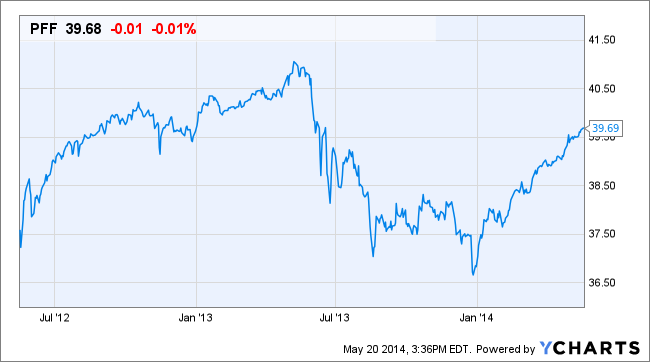A surprise pullback in interest rates and turbulence in some of the riskier areas of the stock market have caused some investors to seek out a mix of relative safety and above-average yields.
Preferred shares seem to have fit the bill for many investors.
For example, the iShares U.S. Preferred Stock ETF (PFF) has posted a total return of 10% so far this year, while the S&P 500 is up about 3% and the small-cap Russell 2000 is actually down about 4%.
Also, the preferred stock ETF pays a distribution yield of nearly 6%.
“Preferred shares are performing well this year with the dip in interest rates,” said Roger Neustadt, co-portfolio manager of the Chantico Fixed Income portfolio. The iShares U.S. Preferred Stock ETF is a holding in the portfolio.
The thinking is that investors are looking for income as rates have declined — the yield on the 10-year Treasury note has fallen to about 2.5% from around 3% at the start of the year.
Preferred shares are hybrid securities that combine features of stocks and bonds. In the capital structure, preferred shares rank above common equity, and below corporate debt. Preferred shares also tend to pay higher dividends than common stock, but generally carry no voting rights.
From a performance standpoint, the preferred stock ETF was weaker during the second half of 2013 as interest rates climbed.
“The sector has rebounded so far in 2014 as Treasury yields decline,” Neustadt said. “Preferred shares have benefited from investors wanting yield. In general, Americans are also still pretty fearful of the stock market. Preferred shares could be relatively safer because they’re higher in the capital structure, but they also provide some equity participation.”
He did point out one of the commonly-cited risks of preferred shares. Namely, that the asset class is concentrated in the financial sector.
“Financial make up a large percentage of the issuance of preferred shares, so it’s certainly a sector risk we’re cognizant of,” Neustadt said.
For more on Covestor’s services, visit Covestor.com or try a free trial.
DISCLAIMER: The investments discussed are held in client accounts as of April 30, 2014. These investments may or may not be currently held in client accounts. The information in this material is not intended to be personalized financial advice and should not be solely relied on for making financial decisions. All investments involve risk, the amount of which may vary significantly. Dividends reflect past performance and there is no guarantee they will continue to be paid. Past performance is no guarantee of future results.





